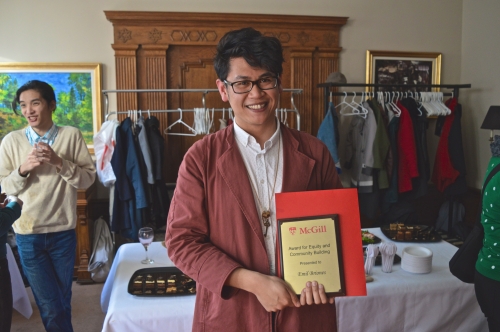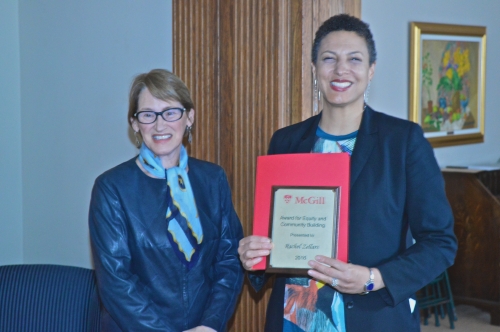4th annual Equity Award Equity and Community Building Award
Winners in the Academic Staff category were Professor Charmaine Nelson of the Faculty of Arts and Professor Nandini Ramanujam of the Faculty of Law.
 |
Professor Charmaine Nelson was recognized for her dedication and accomplishments in connection with improving the campus climate for marginalized members of the McGill community from all backgrounds. A natural leader and role model, Professor Nelson was commended for raising awareness about matters of equity and systemic discrimination through work that bridges the academy with wider communities and audiences. |
 |
Under Professor Nandini Ramanujam’s leadership as the Executive Director, McGill’s Centre for Human Rights and Legal Pluralism has developed a range of crucial social justice and human rights learning opportunities for McGill students. Her success in promoting equity and community building is demonstrated in numerous, concrete ways, for example, through her work examining modes for McGill Law’s response to the Truth and Reconciliation Commission of Canada’s Calls to Action and through her connection of McGill University to the Global Scholars at Risk Network. The award was received by Prof. Véronique Bélanger as pictured. |
 |
The award in the Team category went to the McGill-Centraide Campaign Team: Brett Hooten, Meaghan Thurston-Dawes and Lorraine Torpy. The Team was lauded for its work operationalizing McGill’s commitment to engage with and wield an impact on local communities. In 2015-2016, the Team made terrific gains by vastly increasing participation in the Campaign among McGill faculty, staff and students to raise over $500,000. Nominators underscored the Team’s leadership, infectious enthusiasm and originality in leading fundraising activities for the McGill-Centraide Campaign. |
 |
Emil Briones, Academic Affairs Administrator in the Faculty of Dentistry, was the recipient of this year’s award in the Administrative and Support Staff category. In his years at McGill, initially as a student and presently as a staff member, Emil has advanced a range of equity and anti-oppression initiatives. Currently, he has developed a social justice education curriculum for Dentistry students. His work in this connection is recognized as innovative and insightful. Professor Paul Allison, Dean of the Dentistry Faculty, recognizes Emil as having made “a very strong contribution to the development of the Faculty of Dentistry’s approaches to equity, diversity and inclusiveness.” |
Student awards were bestowed upon both Marilyn Verghis and Rachel Zellers.
 |
Marilyn Verghis’ selection was premised on her passion for social justice and the range of equity-connected initiatives she has led in her role as SSMU’s Equity Commissioner. Examples of such initiatives include a Black History Month Speaker Series event, drafting an Accessibility Policy for SSMU, and developing a steering committee to organize the annual Africa Development convention. Her equity related work is premised on prioritizing marginalized voices, particularly within the student community, with a view to bringing their ideas to the fore. |
 |
Rachel Zellers was recognized for her role as a mentor and educator, particularly for black students at McGill. She is viewed as a passionate and inspiring leader committed to her students’ academic success. Moreover, she is a community activist and public figure who works tirelessly to raise awareness about and to contest equity challenges related to racial discrimination and gender violence. Rachel’s nominees stress that she seeks to ensure that equity and diversity “exist as more than buzzwords” and give effect to real social justice outcomes. |